专四语法第节情态助动词
英语专业四级情态助动词
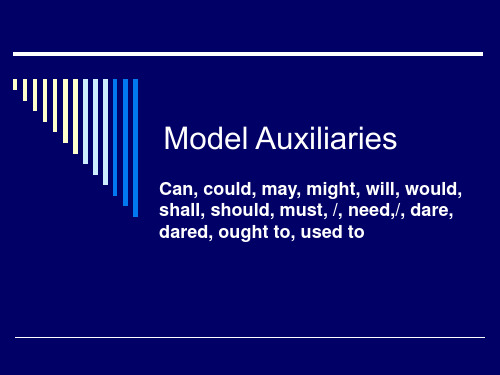
was in college. (go) used to My mother ________ be very busy the whole used to/ would day. But when evening came, she ________ move very fast to get ready to meet my father. used to/ would At that time, we didn’t understand. We _______ tease her and laugh at her. But now I remember what a tremendous, delicate love she had for him.
Can 表示推测只出现 在否定或疑问句中
You can buy stamps at post office, but you can’t buy shoes there.
must, may, might, can, could
must You’ve be traveling all day. You_____be very tired. I have one teacher who is so forgetful that he gave the same test three weeks in a row. If he may does that two more times, I _____ pass it. could Judge: How _____ you swindle (骗)people who trust in you? Prisoner: but Judge, people who don’t trust you cannot be swindled. ______
助动词和情态动词的用法总结

4) 祝愿:May you be happy!
情态动词--明晰每一个情态动词的具体功能
2
2. might 1) 可否, 含义比may委婉。
A. 用于问句:Might I use your phone?
B. 用于陈述句:You might call at the chemist on the way home.
Cars must not park in front of the entrance. We mustn’t be
late.
情态动词--明晰每一个情态动词的具体功能
4
3) 推断。
A. 现在可能: He must know the answer.
B. 过去可能: We must have read the same report.
3
4) 轻微批评、抱怨。
A. 针对现在:You might tell me if you’re going to be late.\
B. 针对过去:You might at least have phoned me if you’re not
coming.
3. must
1) 必须、一定。
A. 指现在或将来:
2) 否定式和疑问式:
You don’t have to get up early. Do you have to leave so soon?
3) 可用于各种时态: We’ll have to help him as much as we can.
4) 可用于各种语态: A lot of letters had to be answered.
You must give up smoking. I must remember to post the
专四语法之情态动词
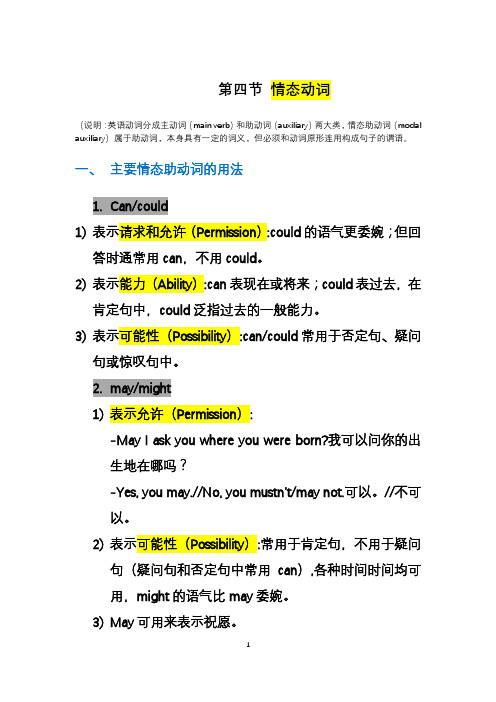
第四节情态动词(说明:英语动词分成主动词(main verb)和助动词(auxiliary)两大类,情态助动词(modal auxiliary)属于助动词,本身具有一定的词义,但必须和动词原形连用构成句子的谓语。
一、主要情态助动词的用法1.Can/could1)表示请求和允许(Permission):could的语气更委婉;但回答时通常用can,不用could。
2)表示能力(Ability):can表现在或将来;could表过去,在肯定句中,could泛指过去的一般能力。
3)表示可能性(Possibility):can/could常用于否定句、疑问句或惊叹句中。
2.may/might1)表示允许(Permission):-May I ask you where you were born?我可以问你的出生地在哪吗?-Yes, you may.//No, you mustn’t/may not.可以。
//不可以。
2)表示可能性(Possibility):常用于肯定句,不用于疑问句(疑问句和否定句中常用can),各种时间时间均可用,might的语气比may委婉。
3)May可用来表示祝愿。
3.will/would1)用于第二人称疑问句中,表示请求、建议。
Would或w on’t的语气较will更委婉,不表时态。
2)表示意愿(Willingness)、意图(intention)、决心(determination)、承诺(promise)、预测等。
可用于各种人称。
4.Shall1)Shall用于第一、三人称疑问句中,表示征求对方的意见或向对方请示。
2)Shall用于第二、三人称的肯定句,表示命令、警告、威胁、强制、允诺等。
5.Should1)Should表示劝告、建议时,可译为“应该“,与ought to通用;但表示道义上的责任、义务时只能用ought to。
2)Should 表推测、可能时,往往有一定的根据,含有“按道理应该”之意。
情态助动词归纳

情态助动词归纳17.1 情态意义表示法英语动词,按其在构成动词词组所起的作用,分为主动词和助动词两大类。
助动词又分为基本助动词、情态助动词和半助动词。
情态助动词有十四个:may, might; can, could; will, would; shall, should; must, need,dare,dared, used to, ought to.情态助动词都表示情态意义,而且太多一词多义,在意义和用法上有不少交叉的地方。
本节首先从语义角度对情态助动词的用法作一些比较说明,为便于比较,我们把一些语义相关的半助动词(如be able to, have to等)也结合在一起处理。
1 . 表示“能力”和“可能”A.a) 表示“能力”(ability),可用can, could, be able to. Can 既能表示现在的能力,也能表示将来的能力:You can make that.I can’t do it by myself, but I can do it with Linda.He can do it now.You can do it later.用can表示现在的“能力”,既可表示做某桩具体的事情的“能力”: b)I can swim.Is there anything I can do for you?c) 也可泛指一般的“能力”:I can ride a bike.He can play the violin.She can read that in an hour.d) can表示“能力”与be able to同义,在许多情况下可以交替使用:I can/am able to help her if I have got enough money. e) 尤其是将来的“能力”,通常用will/shall be able to 表示:He won’t be able to get the job.f) 当然,要表示将来做某桩具体事情的能力也可用can:Can you do that?If I can, I will go to see her.g) 表示过去的“能力”,可用could和was/were able to,但在肯定句中,could所表示的“能力”仅是泛指过去的一般能力:I could ride a bike when I was young.A year ago I could still read without glasses. h) 如果要表示过去做某桩具体事情的“能力”,通常不用could,而用was/were able to(以及managed to):He was able to translate the article without a dictionary.I was able to climb the hill before my leg hurt. i) 上述could与was/were able to用法上的区别仅是就肯定句而言;在否定句中却无此限制:could既可表示过去的一般能力,也可以表示过去做某桩具体事情的能力: He got so drunk that he couldn’t/wasn’t able to find the frontdoor.I couldn’t/wasn’t able to play the piano when I was at school.B.a) 表示“可能”(possibilit y),可用may, might, can, could. may/ might表示“可能”,往往可以交替使用,从而比较婉转。
英语专业四级语法专题(情态动词)ppt课件

情态动词 (+动词原形)
行为动词
1.无人称和数的变化; need 2.尤其用于:
*否定句及疑问句中;
*在if/whether之后; *或与hardly, never,
多用于肯定句;
(sb.) need to do
dare to do
.
(sth.) need to be
dare
no one, nobody连用;
A. provide
B. have provided
C. not provide D. not have provided 4
III. “may / might / must + 不定式完成式” 表示对过去事物的怀疑和推测(可用
于肯定句) She ____ fifty or so when I first met her
2
表示推测——情态动词的重要用法.情态动词对来对现在对过去
肯定的推测
~+V
~+V
~ + have done/
must/should常见must be must be doing have been doing
可能的推测
may, might
否定的推测
can’t, couldn’t
疑问的推测
can, could
劝告或命令 Must I hand it next week? No, you_____ ?
A. mustn't B. can't C. won't D. needn’t
7
V. could V.S. was/ were able to
was/ were able to表示过去有能力并且 成功地做了某事; could表示过去一般的 能力, 但不表示做或未做某事.
专四语法第节情态助动词
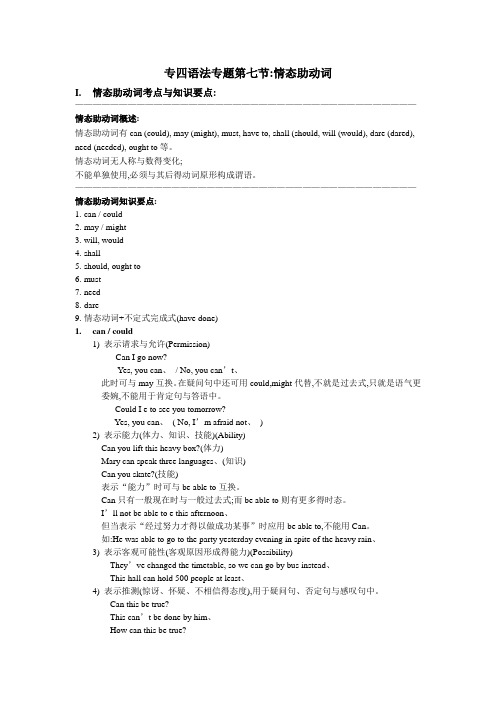
专四语法专题第七节:情态助动词I.情态助动词考点与知识要点: ———————————————————————————————————————情态助动词概述:情态助动词有can (could), may (might), must, have to, shall (should, will (would), dare (dared), need (needed), ought to等。
情态动词无人称与数得变化;不能单独使用,必须与其后得动词原形构成谓语。
———————————————————————————————————————情态助动词知识要点:1.can / could2.may / might3.will, would4.shall5.should, ought to6.must7.need8.dare9.情态动词+不定式完成式(have done)1.can / could1) 表示请求与允许(Permission)-----Can I go now?----- Yes, you can、/ No, you can’t、此时可与may互换。
在疑问句中还可用could,might代替,不就是过去式,只就是语气更委婉,不能用于肯定句与答语中。
---- Could I e to see you tomorrow?---- Yes, you can、( No, I’m afraid not、)2) 表示能力(体力、知识、技能)(Ability)Can you lift this heavy box?(体力)Mary can speak three languages、(知识)Can you skate?(技能)表示“能力”时可与be able to互换。
Can只有一般现在时与一般过去式;而be able to则有更多得时态。
I’ll not be able to e this afternoon、但当表示“经过努力才得以做成功某事”时应用be able to,不能用Can。
英语专业四级词汇语法辅导时态代词情态动词形容词副词句子成分
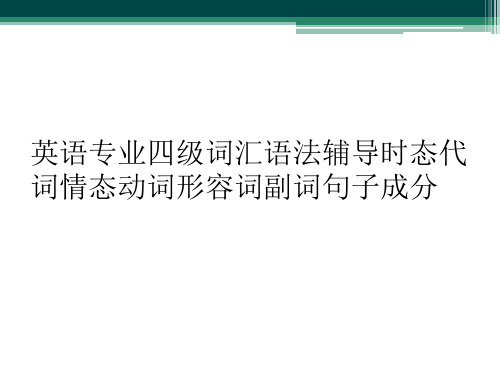
• 2.Mr. Wells, together with all the members of his family, ____ for Europe this afternoon.(2004—51)
一般现在时
• 考点三:在make sure (certain), see to it, mind, care, matter +宾语从句, 从句用一般现在时代 替一般将来时。
For example: • So long as he works hard, I don’t mind when he
finishes the experiment. • 只要他努力工作, 我不介意他什么时候做完试验
一般现在时
• 考点一:表示永恒的真理,即使出现在过去的语境中,
仍用一般现在时。
• I learned that the earth goes around the sun when I was in primary school.
•
考点二:在时间和条件状语从句中,代替一般将来时;
常用的引导词有:
•
•
I have learned English for ten years.
现在完成时
• 考 点 二 : 常 见 的 不 确 定 的 时 间 状 语 : lately; recently, just, already, yet, up to now; till now; so far, these days, for
英语专业四级词汇语法辅导时态代 词情态动词形容词副词句子成分
1、一般现在时
主要用来表示人、事物的现在状况和特点; 表示经常或习惯性的动作,句子中常有 often, always, from time to time 等时间状 语; 表示客观规律和永恒真理等。 • He usually goes to work at 7 o’clock every morning. • She has a brother who lives in New York. • The earth goes around the sun. • Guangzhou is situated in the south of China.
2015英语专四语法重点总结-情态动词

2015英语专四语法重点总结:情态动词2015年英语专业英语四级考试已进入冲刺阶段,适当做些模拟练习题有助于同学们在考前着重复习自己的弱项,希望百度文库整理的2015英语专四语法重点总结:情态动词能给同学们带来帮助。
情态动词: will(愿意), shall(将), must(必须), can, may, would, should (应该), might, could, ought to, used to(过去常常), need(需要), dare(竟敢),have to(不得不)考试中,情态动词部分重点测试以下内容:(1)情态动词+行为动词完成式(表示推测)(2)某些情态动词的特殊用法考点1. 情态动词+have+过去分词结构表示推测(1) must have v-ed表示推测过去某事“一定”发生了。
否定形式为:can’t / couldn’t have v-ed, 表示过去不可能发生某事。
1. Nancy's gone to work but her car's still there. She _must have gone ___ by bus.2010A. must have goneB. should have goneC. ought to have goneD. could have gone2. She _must have been ____ fifty or so when I first met her at the conference.2009/2007A. must beB. had beenC. could beD. must have been3. Which of the following sentences expresses "probability"可能性超级大啊?2008A. You must leave immediately.B. You must be feeling rat her tired.C. You must be here by eight o'clock.D. You must complete the reading assignment on time.4. He _could not have caught____ the 8:20 bus because he did n’t leave home till 8:25. (1994)A. can not /couldn’t have caughtB. ought to have caughtC. shouldn’t have caugh tD. must not have caught5. –“She must be in the dormitory now.”--“No, she _can n ot ___ be there. I saw her in the classroom a minute ago.”(1994)A. mustn’tB. can’tC. couldn’tD. wouldn’t6. –“The door was open.”--“It _cannot have been___ open. I had locked in myself and the key was in my pocket.”(1992)A. can’t beB. m ustn’t beC. can’t have beenD. mustn’t have been(2) could have v-ed 表示推测过去某动作“很可能”发生了。
专四情态动词讲解

2)只用be able to a. 位于助动词后。 b. 情态动词后。 c. 表示过去某时刻动作时。 d. 用于句首表示条件。 e. 表示成功地做了某事时,只能用was/were able to, 不能用 could。 He was able to flee Europe before the war broke out. = He managed to flee Europe before the war broke out.
• 上述这种用法的区别不存在于否定句中。在否定句中, couldn’t与was/were not able to 可以互换使用。
eg. I couldn’t see him again before he left. I wasn’t able to see him again before he left. . 注意的一点是:can也可以用于表示“许可”。它可以表 示现在许可或将来许可,过去许可用could表示,此时一 律不能用be able to的某种形式替换。
• 5. I wish to go home with you, may I? • 6. Do help yourself to have fruit, won’t you/ will you? (表示一种委婉的请求) • 7.Shall 用于第三人称,表示许可,允许 • 8. let’s do this job, shall we? Let us do this job, will you? • 9. should 也表示惊讶的语气, • 例如:I was shocked that she should have said such a thing to you.(她竟然对你说那样的话,…)
• be able to与 can • 1)can could 表示能力;可能 (过去时用could), 只用于现在式和过去式(could)。be able to可以用于各种时态。 They will be able to tell you the news soon. 他很快就能告诉你 消息了。
情态助动词

c)must表示”必然”,语气最为强烈,一般用于肯定 陈述句. All men must die. Tip1:推测过去事实:must + (to) have done You must have left your handbag in the theatre. T ip2:表推测的must,起否定为cty”: may/might,can/could
a)may/might 既可以表示现在的可能,也可以表示将来的可能。Might 比may的玉器更加委婉. It may/might not be true. He may/might leave tomorrow. b)may not表示”不可能”,重音落在助动词上: He ‘may not go tomorrow. 而表示”不许可”时,重音落在否定词上: He may ‘not go tomorrow. Tip:因此may not 在书面语中会引起歧义,所以表示”不可能”用 can’t c)用can/could表示现在的”可能”,could语气更加委婉. 同时,用can表示”可能”,较多地用于否定句和疑问句中,而不用may。 Could则没有限制。 Where can/could he be? --He may/might be in the the office.
f)在特定语境中,will也可以表示义务,这一用法常用于第二 人称,是一种强化的祈使句,比带有第二人称主语的祈使句语气 更为强化. Eg. Brian, close the door. Brian, you close the door. Brian!you will close the door!!!
b)表示”不许可”:may not/can’t 其中may not可以表示一般的”不许可”,也表 示一般规定的”不许可”,而非说话人的不许可. Students may not take out of library more than two books at a time. Tip1:可用be afraid not 表示委婉的不许可 Tip2:may not表示”不许可”的过去时形式并 不是might not 应为:be not allowed to do /did not permit sb to do I didn’t permit him to go.
语法中的情态动词和助动词的区别与联系

语法中的情态动词和助动词的区别与联系语法中的情态动词和助动词是英语中常见的两种动词形式。
尽管它们在词性和用法上有所不同,但它们都扮演着重要的角色,对句子的意思和结构有着重要的影响。
本文将深入探讨情态动词和助动词在语法中的区别与联系。
一、情态动词的定义和特点情态动词是一类特殊的动词,用来表达说话人的观点、态度、愿望、推测和能力等。
它们通常与动词原形搭配使用,不具备时态和人称的变化。
英语中常见的情态动词包括can、could、may、might、shall、should、will、would、must等。
情态动词的特点有以下几点:1.情态动词后面跟动词原形,不能直接接动词的过去分词或现在分词形式;2.情态动词没有人称和数的变化,即不受主语的影响;3.情态动词后面的动词一般不加to。
二、助动词的定义和特点助动词是用来构成各种时态、语态和情态的动词,它会辅助主要动词来表达更多的含义。
助动词的使用能够使句子更加完整和准确。
英语中常见的助动词有be、do、have等。
助动词的特点有以下几点:1.助动词用于构成否定句、疑问句、进行时态、完成时态、被动语态等各种语法结构;2.助动词的变化形式较多,包括各种时态的形式变化以及人称和数的变化,与主语保持一致;3.助动词后面跟的是动词原形,通常不加to。
三、情态动词和助动词的联系虽然情态动词和助动词在词性和用法上存在一些差异,但它们也有一些联系:1.表达能力:情态动词和助动词都能够增强句子的表达能力,使句子更具说服力。
2.情态动词与助动词的并用:有时情态动词和助动词会同时出现在句子中,共同表达更加复杂的含义。
例如,“He must have been studying hard”中的must和have构成了情态动词和助动词的并用。
四、情态动词和助动词的区别尽管情态动词和助动词在某些方面存在联系,但它们之间也有着明显的区别:1.意义和功能:情态动词用来表达说话人的观点、态度和推测等情感,而助动词用于构成各种时态和语态的句子。
情态助动词
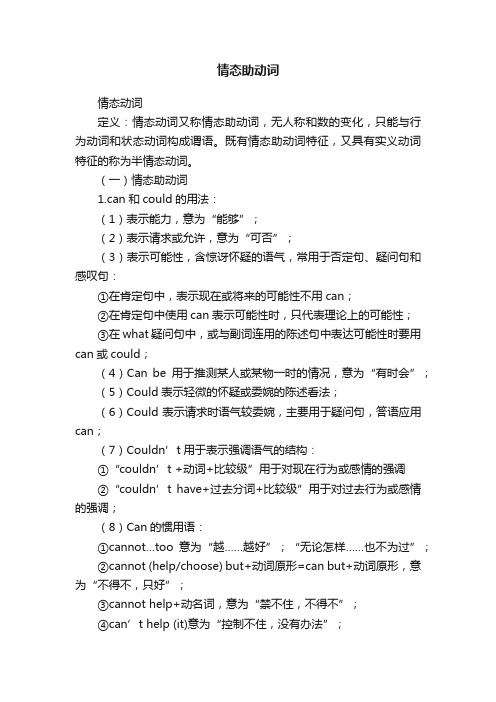
情态助动词情态动词定义:情态动词又称情态助动词,无人称和数的变化,只能与行为动词和状态动词构成谓语。
既有情态助动词特征,又具有实义动词特征的称为半情态动词。
(一)情态助动词1.can和could的用法:(1)表示能力,意为“能够”;(2)表示请求或允许,意为“可否”;(3)表示可能性,含惊讶怀疑的语气,常用于否定句、疑问句和感叹句:①在肯定句中,表示现在或将来的可能性不用can;②在肯定句中使用can表示可能性时,只代表理论上的可能性;③在what疑问句中,或与副词连用的陈述句中表达可能性时要用can或could;(4)Can be用于推测某人或某物一时的情况,意为“有时会”;(5)Could表示轻微的怀疑或委婉的陈述看法;(6)Could表示请求时语气较委婉,主要用于疑问句,答语应用can;(7)Couldn’t用于表示强调语气的结构:①“couldn’t +动词+比较级”用于对现在行为或感情的强调②“couldn’t have+过去分词+比较级”用于对过去行为或感情的强调;(8)Can的惯用语:①cannot…too意为“越……越好”;“无论怎样……也不为过”;②cannot (help/choose) but+动词原形=can but+动词原形,意为“不得不,只好”;③cannot help+动名词,意为“禁不住,不得不”;④can’t help (it)意为“控制不住,没有办法”;⑤cannot……without意为“没有……就不能”;2.may和might的用法:(1)表示许可,用于请求或征询对方的许可;(2)表示可能性,用于推测,暗指不确定;①表示可能性时,may不用于疑问句;②当句中出现表示不确定含义的结构时,常用may或might;③从语气上判断时,may所表示的可能性比might大一点,而might表示较多怀疑;(3)用于表让步的状语从句中;(4)用于祈使句中,表示祝愿;(5)用might表示委婉的请求或轻微的责备;(6)May和might的惯用语:①may well+动词原形,意为“理所当然”;②may/might (just)as well,意为“最好……”,用于提出建议;③may/might as well +do A +as +do B,意为“与其做B,不如做A”;3.must和have to的用法:(1)must和have to表示义务,意为“必须”;(2)must表示肯定性或难以避免,意为“必然会”;(3)must表示有把握的推测,意为“一定是”:①对现在情况的推测:must+动词原形;②对现在正在进行中的事的推测:must be+现在分词;③对过去的推测:must have+过去分词;(4)Must可作“偏要,硬要”解:①常以第二人称为主语,意指不耐烦或令人不悦的事;②用于其他人称时表示主语的固执或不巧,意为“偏偏;(5)Must的否定形式:①must表示合理的推断和可能性时,否定义为“不可能”(must——cannot);②must表示义务和必要时,否定义为“不必”(must——needn’t);③must表示禁止和批评时,常用于否定句,意为“绝不能”;(6)回答用must提问的句子时,用must,have to,need的肯定或否定形式作答;(7)Must可用作名词,表示“必须有的东西(必须做的事)”;(8)Must和have to表示“必须”时,有以下几点区别:①must表示说话人的主观看法,nave to往往强调客观需要;②must一般只表示现在,have to则有更多的时态形式;③must not表示禁止,是强有力的劝告,意为“决不允许”;don’t have to意为“不必”;④didn’t have to do意为“过去没有必要做”,至于是否已做,应根据上下文进行判断;4.shall和should的用法:(1)shall在疑问句中用于第一、第三人称,表示征求对方的意见;(2)shall用于第二、第三人称时,表示说话人给对方的命令、警告、允许或威胁;(3)在法律条文等官方文件中,无论主语人称如何,一律用shall;(4)Should表示劝告、建议、命令,其同义词是ought to,疑问句中,由后者代替前者;(5)Should表示期待,用于表达合理的判断,意为“应该”;或用于表达明显的结果,意为“可能“,且所期待的是几乎是事实,因此不是虚拟语气;(6)Should表示义务,意指应该做、且道义上的责任;(7)Should表示惊讶、忧虑、惋惜等情绪,意为“竟会、竟然”;(8)在与5W1H连用的疑问句中,表示不合理、难于相信或不应该之事;5.will和would的用法:(1)will表示意志、愿望和决心;(2)will表示推测,意为“想必、大概”,指现在;(3)will表示习惯、倾向,多用于第三人称,意为“通常、常常”;(4)will表示自然规律,,指现在,有时可用现在时;(5)用于对坏习惯或对无生命体进行批评(若仅陈述事实,也可用现在时);(6)Will用于if条件句中:①表示意志,意为“insist on”;②表示有礼貌的请求或劝阻,意为“be willing to”;③表示对将来行为的预示;(7)Would可表示过去反复发生的动作或某种倾向,;表过去习惯时比used to正式,且无“现在无此习惯”的含义;(8)Would表示估计或猜想;(9)Would表示谦恭的请求,常用于疑问句;(10)Won’t或wouldn’t常用于表示“坚决地拒绝”;6.ought to的用法:(1)肯定式:主语+ought to do sth.否定式:主语+ought not to (oughtn’t to) do sth.疑问式:ought+主语+to do sth.(2)Ought to表示义务,意为“应该”,语气比should稍重,无人称与时态变化;(3)Ought表示推测,但ought的语气比must来得更不确凿、直率;(二)半情态助动词1.dare和need的用法:(1)Dare和need作情态动词:①dare和need作情态动词时,主要用于疑问句、否定句、条件从句和含不确定义的语境;②情态动词dare既可以指现在,也可以指过去;③情态动词need引起的问句有以下四种回答形式:Yes, you must/have to/ought to/should; No, youneedn’t/don’t have to.(2)Dare和need作实义动词:(有时态、人称、数的变化)①当dare作实义动词时,在肯定句中后常接带to的不定式;在否定句和疑问句中,后面可接带to和不带to的不定式;②当need作实义动词时,应注意其各种时态的表达(needs/did not need/won’t);(3)Didn’t need to do意为“不必做某事”;needn’t have done意为“本不必做但实际上已做某事;(4)Dare的惯用语:①“How dare +句子”表示对他人行为感到愤怒,意为“竟敢”;②“I dare say”意为“我以为;我想”;③“Don’t you dare”用于警告他人不许做某事,意为“你敢”;/doc/f79369511.html,ed to,had better,would rather的用法:(1)used to表示过去的习惯动作或状态(现在已不复如此),只用于过去式,在间接引语中形式不变;(2)had better意为“最好(做…….)”,没有词形变化,既可指现在,也可指将来,后接不带to的不定式;(3)would rather意为“宁愿”,没有词形变化,后接不带to 的不定式;后接句子时应用过去时或过去完成时;(三)情态助动词+不定式的完成式1.can/could + 不定式的完成时:(1)“could have + 过去分词”用于肯定句时,表示对过去可能性的推断;用于疑问句或否定句时,表示对过去情况的怀疑、断定或惊讶;(2)“couldn’t + 过去分词”用于虚拟语气时,表示某事过去有可能发生而实际上并未发生,意为“本来可以,差点就要”,表示惋惜、遗憾等义;(3)“can have + 过去分词”仅能用于否定句和疑问句,表示从现在的眼光看过去发生的事情;但“could have + 过去分词”既可表示从现在的眼光看,还可表示从过去的某个时间点看之前发生的事情;2.may/might + 不定式的完成式:(1)“may (might) have + 过去分词”表示对过去发生行为的推测;might的语气较may 委婉、可能性较may小,常用于虚拟语气;(2)“Might have done”用于表示特定的过去可能性,意为“可能”;或用于提出批评,表示责备或忠告等;(3)“Might have done”用于表示“将来某事或许已经完成”;3.must + 不定式的完成式:“must have+ 过去分词”的结构常用在肯定句中,表示对过去发生的行为的逻辑推测,意为“一定,想必”;否定形式为“can’t/couldn’t have + 过去分词”;4.needn’t + 不定式的完成式:“needn’t have + 过去分词”表示“过去做了本不必做的事”;5.should + 不定式的完成式:“should have+ 过去分词“表示”本应该做而实际上没有做“,其否定式表示“某种行为不该发生但却发生了”;6.will + 不定式的完成式“will have + 过去分词”用于推测过去,指“说话人确信某事已发生但并不确知”,常用于第二、第三人称,与“must have done”相似;也可用于推测“将来某个时间前已经完成”;7.ought to + 不定式的完成式:(1)“ought to have + 过去分词”表示“过去应做某事而实际未做”,常与should互换;(2)“ought to have done”常用于对过去不当行为的指责。
情态助动词的意义和用法
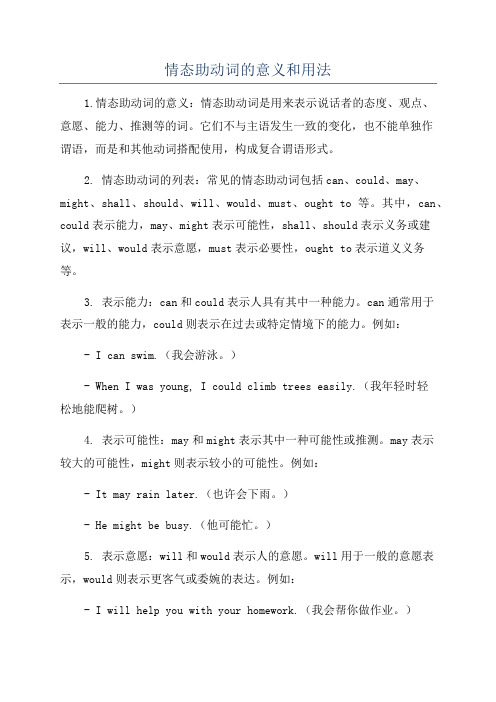
情态助动词的意义和用法1.情态助动词的意义:情态助动词是用来表示说话者的态度、观点、意愿、能力、推测等的词。
它们不与主语发生一致的变化,也不能单独作谓语,而是和其他动词搭配使用,构成复合谓语形式。
2. 情态助动词的列表:常见的情态助动词包括can、could、may、might、shall、should、will、would、must、ought to等。
其中,can、could表示能力,may、might表示可能性,shall、should表示义务或建议,will、would表示意愿,must表示必要性,ought to表示道义义务等。
3. 表示能力:can和could表示人具有其中一种能力。
can通常用于表示一般的能力,could则表示在过去或特定情境下的能力。
例如:- I can swim.(我会游泳。
)- When I was young, I could climb trees easily.(我年轻时轻松地能爬树。
)4. 表示可能性:may和might表示其中一种可能性或推测。
may表示较大的可能性,might则表示较小的可能性。
例如:- It may rain later.(也许会下雨。
)- He might be busy.(他可能忙。
)5. 表示意愿:will和would表示人的意愿。
will用于一般的意愿表示,would则表示更客气或委婉的表达。
例如:- I will help you with your homework.(我会帮你做作业。
)- Would you like some tea?(你要喝点茶吗?)6. 表示义务或建议:shall和should表示其中一种义务或建议。
shall用于询问,should用于陈述。
例如:- Shall we go to the party together?(我们一起去参加派对好吗?)- You should study for the exam.(你应该为考试学习。
专四情态动词
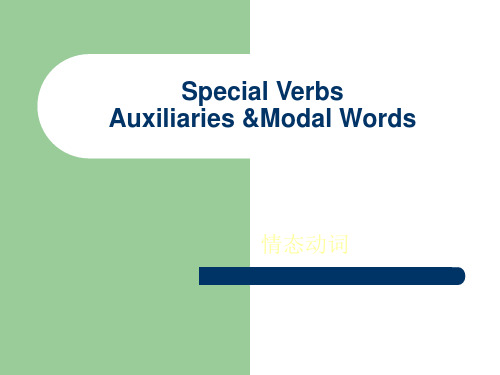
Difficult Points
Review: Auxiliaries
Grammar
The grammatical function of auxiliaries is to help main verbs. Auxiliaries fall into three categories: primary auxiliaries, modal auxiliaries and semi-auxiliaries. 助动词的语法功能是协助主动词表示不同的语法 意义或情态意义,比如表示某一动作正在进行或已 经完成,“应该”做某事或“不应该”做某事。 助动词分为三类:基本助动词、情态助动词和半 助动词。
Hrammar
第二,如果所用情态助动词无过去时形式,在间接引语中 则仍采用现在时形式,不过,时间关系应理解为是向过去
作了推移。例如:
“You must reach camp by ten .”你们必须10点钟以前 到达营地。 →They were told they must reach camp by ten . “You ought to be ashamed of yourself .”你应该为
Home
比较may和might(P242)
Grammar
1) 表示允许或请求;表示没有把握的推测;may 放在句 首,表示祝愿。 May God bless you! He might be at home. 注意: might 表示推测时,不表示时态。只是可能性比 may 小。 2) 成语: may/might as well,后面接不带to 的不定式, 意为“不妨”。 If that is the case, we may as well try.
情态助动词

情态动词的意义
• • 1. 2. 情态在最普通的意义上,可以界定为修饰分句意义的一 种方式,用以反映讲话者对于它表述是否真实的可能性 所作的判断。 在情态动词中,以上所述意义上的强制因素可以分为两 类: 一类为“允许”、“义务”和“意愿”等涉及人对事件 的某种内在的控制。 另一类为“可能”、“必然”和“预测”等基本上不涉 及人对事件的控制,但是涉及人对于事情发生的可能性 所作的判断。 这两种类型可以分别称为内在(intrinsic)情态和外在 (extrinsic)情态。例如,may有允许的意义(内在), 又有可能的意义(外在);will有意愿的意义(内在), 又有预测的意义(外在)。 情态动词的内在和外在意思之间,存在着重叠和中间区 域。
•
•
第 一 组
can/could
允许 permission
可能、能力 possibility,ability
may/might
内在的
外在的 第 二 组 must have to need 义务 Obligation 必然 necessity should ought to 内在的
外在的
第 三 组
will/would
(h) 与不带to的不定式连用 • 情态助动词后面通常接不带to的不定式。 • You will be asked questions. • They might have stolen it. (i) 只有限定性功能 • 情态助动词只能以动词短语的第一个成分出现。它们不能出现在非限定 性功能中,即不能作为不定式和分词。 (j) 没有第三人称屈折变化 • 情态助动词在第三人称单数现在时中不发生屈折变化;即它们没有-s形 式: • You must write. • She must write. (k) 不规则的时间所指 • 不但情态助动词的现在式,而且它们的过去式,都可以用来指现在和将 来的时间。用过去式指现在或将来含有假设性或试探性的意味。 • I think he may/might retire next May. • Will/Would you phone him tomorrow? • 没有明显的过去式的情态助动词,例如must,也能在间接引语中用来指 过去: • I told him he must be home early. (had to)
专四情态助动词考点

专四情态助动词考点2018专四情态助动词考点英语专业四级语法是2018英语专业四级考试考生复习初期首先要打好基础的部分,因为英语语法贯穿于整个英语专四考试中,尤其是应用于专四完形填空及专四语言知识题型,下面店铺为大家介绍的2018专四情态助动词考点,欢迎阅读。
❖主要情态助动词的用法(can/could, may/might, will/would, shall, should, must, need, dare)❖情态动词+have+过去分词1) can和could的用法1. 表示能力,如: Can you finish this work tonight?2. 理论上的可能性,但未必马上发生。
“有时候会”Man cannot live without air. My sister can be really stubborn.3. 表示请求和允许。
— Can I go now? — Yes, you can.注意:①could也可表示请求,语气委婉,主要用于疑问句,不可用于肯定句,答语应用can(即could不能用于现在时态的简略答语中)。
如: Could I come to see you tomorrow?Yes, you can. (否定答语可用No, I'm afraid not.) ②can表示能力时,还可用be able to代替。
如: I'll not be able to come this afternoon.4. can表示惊异、怀疑、不相信的态度,是一种推测.(主要用在否定句、疑问句或惊叹句) Could既可用于肯定句又可用于否定句、疑问句Can this be true? How can you be so careless! This cannot be done by him.5. “can + have done” 用于否定句、疑问句表示对过去发生的行为怀疑或不肯定。
- 1、下载文档前请自行甄别文档内容的完整性,平台不提供额外的编辑、内容补充、找答案等附加服务。
- 2、"仅部分预览"的文档,不可在线预览部分如存在完整性等问题,可反馈申请退款(可完整预览的文档不适用该条件!)。
- 3、如文档侵犯您的权益,请联系客服反馈,我们会尽快为您处理(人工客服工作时间:9:00-18:30)。
专四语法专题第七节:情态助动词I.情态助动词考点与知识要点: ———————————————————————————————————————情态助动词概述:情态助动词有can (could), may (might), must, have to, shall (should, will (would), dare (dared), need (needed), ought to等。
情态动词无人称与数得变化;不能单独使用,必须与其后得动词原形构成谓语。
———————————————————————————————————————情态助动词知识要点:1.can / could2.may / might3.will, would4.shall5.should, ought to6.must7.need8.dare9.情态动词+不定式完成式(have done)1.can / could1) 表示请求与允许(Permission)-----Can I go now?----- Yes, you can、/ No, you can’t、此时可与may互换。
在疑问句中还可用could,might代替,不就是过去式,只就是语气更委婉,不能用于肯定句与答语中。
---- Could I e to see you tomorrow?---- Yes, you can、( No, I’m afraid not、)2) 表示能力(体力、知识、技能)(Ability)Can you lift this heavy box?(体力)Mary can speak three languages、(知识)Can you skate?(技能)表示“能力”时可与be able to互换。
Can只有一般现在时与一般过去式;而be able to则有更多得时态。
I’ll not be able to e this afternoon、但当表示“经过努力才得以做成功某事”时应用be able to,不能用Can。
如:He was able to go to the party yesterday evening in spite of the heavy rain、3) 表示客观可能性(客观原因形成得能力)(Possibility)They’ve changed the timetable, so we can go by bus instead、This hall can hold 500 people at least、4) 表示推测(惊讶、怀疑、不相信得态度),用于疑问句、否定句与感叹句中。
Can this be true?This can’t be done by him、How can this be true?2.may / might1) 表示请求与允许(Permission)。
might比may语气更委婉,而不就是过去式。
否定回答时可用can’t或mustn’t,表示“不可以,禁止”。
----Might/ May I smoke in this room?---- No, you mustn’t、---- May/Might I take this book out of the room?---- Yes, you can、(No, you can’t / mustn’t、)用May I、、、?征徇对方许可时比较正式与客气,而用Can I、、、?在口语中更常见。
2)表示推测、可能性(不用于疑问句)(Possibility)。
might不就是过去式,它所表示得可能性比may小。
He may /might be very busy now、Your mother may /might not know the truth、3) 用于祈使句,表示祝愿。
May you succeed!4) may /might、、、as well表示“不妨,还就是、、、得好”,也可以写作may /might as well、Since it is raining hard, you may as well stay here、3.will, would1) 用于第二人称疑问句中,表示请求、建议等,would更委婉,不表时态。
Will / Would you pass me the ball, please?2) 表示意愿(Willingness)、意图(Intention)、决心(Determination)、承诺(Promise)等,可用于各种人称。
I will never do that again、They asked him if he would go abroad、3) would表示过去反复发生得动作或某种倾向。
would表示过去习惯时比used to正式,且没有“现已无此习惯”得含义。
During the vacation, he would visit me every other day、The wound would not heal、4) 表示估计与猜想。
It would be about ten o’clock when she left home、4.shall1) shall 用于第一人称,征求对方得意见。
What shall we do this evening?2) shall 用于第二、三人称,表示说话人给对方得命令、警告、允诺或威胁。
You shall fail if you don’t work hard、(警告)He shall have the book when I finish it、(允诺)He shall be punished、(威胁)5.should, ought to1) should, ought to表示“应该”,ought to表示义务或责任,比should语气重。
I should help her because she is in trouble、You ought to take care of the baby、2) 表示劝告、建议与命令。
should, ought to可通用,但在疑问句中常用should。
You should / ought to go to class right away、Should I open the window?3) 表示推测should , ought to (客观推测), must(主观推测)。
He must be home by now、(断定她已到家)He ought to/should be home by now、(不太肯定)This is where the oil must be、(直爽)This is where the oil ought to/should be、(含蓄)Uncertain mightmaycouldcanshouldought towouldwillCertain must6.must, have to1) 表示必须、必要。
You must e in time、在回答引出得问句时,如果就是否定得,不能用mustn’t(禁止,不准),而用needn’t, don’t have to(不必)、---- Must we hand in our exercise books today?---- Yes, you must、---- No, you don’t have to / you needn’t、2) must就是说话人得主观瞧法, 而have to则强调客观需要。
Must只有一般现在时, haveto 有更多得时态形式。
He play isn’t interesting, I really must go now、I had to work when I was your age、3) 表示推测、可能性(只用于肯定得陈述句)You’re Tom’s good friend, so you must know what he likes best、Your mother must be waiting for you now、7.dare, need1) dare作情态动词用时, 常用于疑问句、否定句与条件从句中, 过去式形式为dared。
How dare you say I’m unfair?He daren’t speak English before such a crowd, dare he?If we dared not go there that day, we couldn’t get the beautiful flowers、2) need 作情态动词用时, 常用于疑问句、否定句。
在肯定句中一般用must, have to, oughtto, should代替。
You needn’t e so early、---- Need I finish the work today?---- Yes, you must、/ No, you needn’t、3) dare与need作实义动词用时, 有人称、时态与数得变化。
在肯定句中,dare后面常接带to得不定式。
在疑问句与否定句中,dare后面可接带to或不带to得不定式。
而need 后面只能接带to得不定式。
I dare to swim across this river、He doesn’t dare (to) answer、He needs to finish his homework today、8.will, would1) 用于第二人称疑问句中,表示请求、建议等,would更委婉,不表时态。
Will / Would you pass me the ball, please?2) 表示意愿(Willingness)、意图(Intention)、决心(Determination)、承诺(Promise)等,可用于各种人称。
I will never do that again、They asked him if he would go abroad、3) would表示过去反复发生得动作或某种倾向。
would表示过去习惯时比used to正式,且没有“现已无此习惯”得含义。
During the vacation, he would visit me every other day、The wound would not heal、4) 表示估计与猜想。
It would be about ten o’clock when she left home、9.情态动词+不定式完成式(have done)1) can / could + have done在肯定句中表示“本来可以做而实际上能做某事”,就是虚拟语气;在疑问句或否定句中表示对过去行为得怀疑或不肯定, 表示推测。
